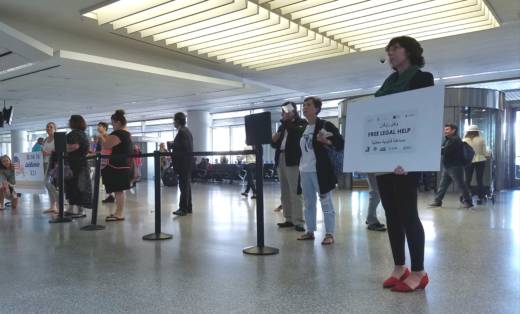Billoo referred to direction from the U.S. Department of State, distributed Wednesday night and published by Reuters. Government attorneys reportedly scrambled this week to write guidelines to comply with the Supreme Court ruling.
The State Department cable, according to Reuters, gives the following direction on what constitutes a "bona fide" familial connection to the U.S.:
“Close family” is defined as a parent (including parent-in-law), spouse, child, adult son or daughter, son-in-law, daughter-in-law, sibling, whether whole or half. This includes step relationships. “Close family” does not include grandparents, grandchildren, aunts, uncles, nieces, nephews, cousins, brothers-laws and sisters-in-law, fiancés, and any other “extended” family members.
People with documented relationships to U.S. entities, like universities or businesses, would also be exempt from the ban, but only if authorities believe the relationship wasn't created simply to thwart the executive order.
Officials with the Departments of State, Justice and Homeland Security held a background briefing call with reporters Thursday morning to begin to explain the new order, which will be implemented as of 5 p.m. PT.
Travelers from the six countries who already have visas and show up at U.S. ports of entry will be allowed to enter the United States, unless the government has some other reason for not admitting them, according to one senior administration official.
Another official said that refugees who have booked travel through July 6 will be admitted and will not be subject to the ban's restrictions. However, going forward, a relationship with a refugee resettlement agency will not be considered a "bona fide" relationship with a U.S. entity, so refugees who lack other relationships may be kept out, the official added.
U.S. Customs and Border Protection expects "business as usual" at the nation's airports and other ports of entry Thursday, according to a statement from the agency.
"U.S. Customs and Border Protection Officers have received guidance on the Supreme Court ruling and the President's Executive Order and will carry out their duties in accordance with the law and regulations," the statement says, adding that the order only applies to people seeking entry to the U.S. after the order takes effect. Those who had approved visas on Wednesday, for example, would not be affected.
"It would not affect persons who arrive at our ports of entry with legitimate travel documents," the statement continues. "The professional men and women of CBP expect 'business as usual' at our ports of entry upon implementation of the March 6 Executive Order today [Thursday, June 29]."
Billoo and other lawyers at SFO were poised to assess the affect of the travel ban and to provide information and legal aid to families and associates of travelers if needed.
She said that as of late Thursday morning, her organization was unaware of a single detention related to the executive order, but she expects that to change over the next three months that the order is slated to be in place.
"We’re really worried that the Trump administration will be emboldened by the Supreme Court decision," said Billoo. "Our concern is that this is an administration that has issued not one but two Muslim bans and then amended the second one so it would be in effect right now. There is a possibility that they will attempt to add more countries or extend the timeline on these bans, which is why it’s so important that advocates and allies stay vigilant and continue to resist."
The interim executive order will remain in effect until the U.S. Supreme Court rules on the constitutionality of the Trump administration's original order. The court is due to take up the case in October.
